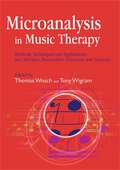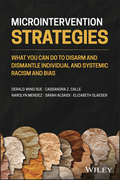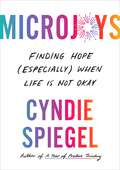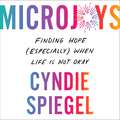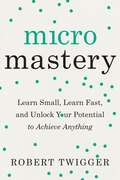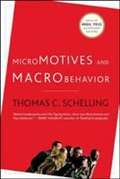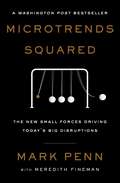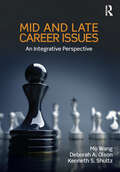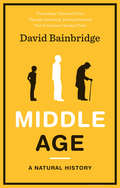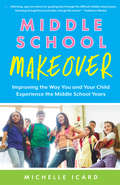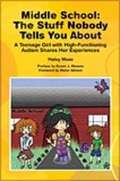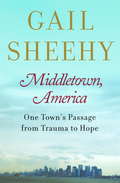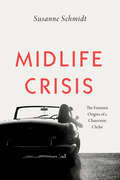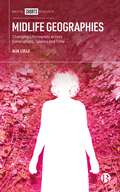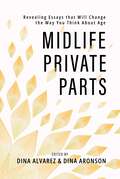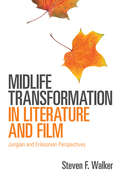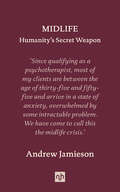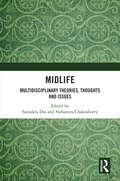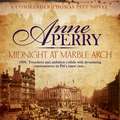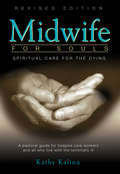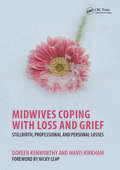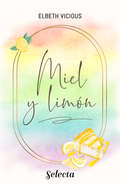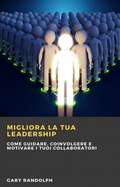- Table View
- List View
Microanalysis in Music Therapy: Methods, Techniques and Applications for Clinicians, Researchers, Educators and Students
by Tony Wigram Barbara L Wheeler Thomas WoschIn the context of music therapy, microanalysis is the detailed analysis of that short period of time during a music therapy session during which some kind of significant change takes place. These moments are crucial to the therapeutic process, and there is increasing interest amongst music therapists in understanding how they come about and whether there are ways of initiating them. The contributors to this groundbreaking book look at methods of micro process analyses used in a variety of music therapy contexts, both clinical and research-based. They outline their methods, which include using video and audio materials, interviewing, and monitoring the client's heart rate, and also give examples of the practical application of microanalysis from their clinical experience, including work with clients who have psychiatric illness, autism and other conditions. Microanalyses in Music Therapy provides a wealth of important theoretical and practical information for music therapy clinicians, educators and students.
Microintervention Strategies: What You Can Do to Disarm and Dismantle Individual and Systemic Racism and Bias
by Derald Wing Sue Cassandra Z. Calle Narolyn Mendez Sarah Alsaidi Elizabeth GlaeserLearn how you can help combat micro and macroaggressions against socially devalued groups with this authoritative new resource Microintervention Strategies: What Targets, Allies and Bystanders Can Do to Eliminate Bias delivers a cutting-edge exploration and extension of the concept of microinterventions to combat micro and macroaggressions targeted at marginalized groups in our society. While racial bias is the primary example used throughout the book, the author's approach is applicable to virtually all forms of bias and discrimination, including that directed at those with disabilities, LGBTQ people, women, and others. The book calls out unfair and biased institutional policies and practices and presents strategies to help reduce the impact of sexism, heterosexism, ableism, and classism. It provides a new conceptual framework for distinguishing between the different categories of microinterventions, or individual anti-bias actions, and offers specific, concrete, and practical advice for taking a stand against micro and macroaggressions. Microintervention Strategies delivers the knowledge and skills necessary to confront individual and institutional manifestations of oppression. Readers will also enjoy: A thorough introduction to the major conceptual distinctions between micro and macroaggressions and an explanation of the manifestations, dynamics, and impact of bias on marginalized groups An exploration of the meaning and definition of microinterventions, including a categorization into three types: microaffirmations, microprotections, and microchallenges A review of literature that discusses the positive benefits that accrue to targets, allies, bystanders, and others when microinterventions take place A discussion of major barriers to acting against prejudice and discrimination Perfect for undergraduate and graduate students taking courses in psychology, education, social work, and political science, Microintervention Strategies will also earn a place in the libraries of psychologists, educators, parents, and teachers, who hope to do their part to combat microaggressions and other forms of bias and discrimination.
Microjoys: Finding Hope (Especially) When Life is Not Okay
by Cyndie SpiegelBighearted and hopeful. Unflinchingly honest and healing. A profound compendium of intimate, inspiring essays and thoughtful prompts that will keep you afloat in difficult times and sustain you in the everyday.Microjoys are a practice of uncovering joy and finding hope at any moment. They are accessible to everyone, despite all else. When we hone the ability to look for them, they are always available. Microjoys are the hidden wisdom, deep memories, subtle treasure, and ordinary delights that surround us: a polka-dot dress on a thrift store shelf. A dear friend's kindness at just the right time. The neighborhood spice shop. A beloved family tradition. The simple quietude of being in love. A cherished recipe.Cyndie Spiegel first began taking note of microjoys during the most difficult year of her life - when she experienced back-to-back unprecedented and devastating losses - and she found that these fleeting moments of hope helped her move through each day with a semblance of comfort and a lot more joy.Through beautifully written chapters and prompts, Cyndie shares the microjoys that have kept her going through tough times and shows us how we can learn to see the microjoys in our own lives. Microjoys don't change the truth of loss or make grief any more convenient, but they allow us to temporarily touch joy, keeping us buoyed and moving forward, one moment at a time.
Microjoys: Finding Hope (Especially) When Life is Not Okay
by Cyndie SpiegelBighearted and hopeful. Unflinchingly honest and healing. A profound compendium of intimate, inspiring essays and thoughtful prompts that will keep you afloat in difficult times and sustain you in the everyday.Microjoys are a practice of uncovering joy and finding hope at any moment. They are accessible to everyone, despite all else. When we hone the ability to look for them, they are always available. Microjoys are the hidden wisdom, deep memories, subtle treasure, and ordinary delights that surround us: a polka-dot dress on a thrift store shelf. A dear friend's kindness at just the right time. The neighborhood spice shop. A beloved family tradition. The simple quietude of being in love. A cherished recipe.Cyndie Spiegel first began taking note of microjoys during the most difficult year of her life - when she experienced back-to-back unprecedented and devastating losses - and she found that these fleeting moments of hope helped her move through each day with a semblance of comfort and a lot more joy.Through beautifully written chapters and prompts, Cyndie shares the microjoys that have kept her going through tough times and shows us how we can learn to see the microjoys in our own lives. Microjoys don't change the truth of loss or make grief any more convenient, but they allow us to temporarily touch joy, keeping us buoyed and moving forward, one moment at a time.
Micromastery: Learn Small, Learn Fast, And Find The Hidden Path To Happiness
by Robert TwiggerWant to be a lifelong learner? Think small.Forget spending 10,000 hours in the pursuit of perfecting just one thing. The true path to success and achievement lies in the pursuit of perfecting lots and lots of small things--for a big payoff.Combining positive psychology, neuroscience, self-help and more, this delightfully illuminating book encourages us to circumvent all the reasons we "can't" learn and grow (we're too busy, it's too complicated, we're not experts, we didn't start when we were young) -- by tackling small, satisfying skills. Wish you were a seasoned chef? Learn to make a perfect omelette. Dream of being a racecar driver? Perfect a handbrake turn. Wish you could draw? Make Zen circles your first challenge. These small, doable tasks offer a big payoff -- and motivate us to keep learning and growing, with payoffs that include a boost in optimism, confidence, memory, cognitive skills, and more.Filled with surprising insights and even a compendium of micromastery skills to try yourself, this engaging and inspiring guide reminds us of the simple joy of learning -- and opens the door to limitless, lifelong achievement, one small step at a time.Micromasteries presented in the book (with illustrations) include: Learn How to Climb a Rope, Surf Standing Up, Talk for Fifteen Minutes about Any Subject, Bake Artisan Bread, Juggle Four Balls, Learn to Read Japanese in Three Hours, and more.
Micromotives and Macrobehavior (Updated Edition)
by Thomas C. SchellingMicromotives and Macrobehavior was originally published over twenty-five years ago, yet the stories it tells feel just as fresh today. And the subject of these stories -- how small and seemingly meaningless decisions and actions by individuals often lead to significant unintended consequences for a large group -- is more important than ever. In one famous example, Thomas C. Schelling shows that a slight-but-not-malicious preference to have neighbors of the same race eventually leads to completely segregated populations. The updated edition of this landmark book contains a new preface and the author's Nobel Prize acceptance speech.
Microorganisms and Mental Health (Current Topics in Behavioral Neurosciences #61)
by Jonathan Savitz Robert H. YolkenThis volume contains up-to-date contributions written by leading experts in the role played by various microorganisms in psychiatric and neurological illness. The initial chapters present an evolutionary framework for the impact of microorganisms on behavior. This is followed by historical and epidemiological perspectives of the role of viruses in psychiatric illness. Subsequent chapters focus on different classes of microorganisms and psychiatric illnesses and emphasize diverse research approaches ranging from preclinical models to therapeutic interventions.
Microtrends Squared: The New Small Forces Driving the Big Disruptions Today
by Mark Penn Meredith FinemanTen years after his bestseller Microtrends, Mark Penn identifies the next wave of trends reshaping the future of business, politics, and culture.Mark Penn has boldly argued that the future is not shaped by society’s broad forces but by quiet changes within narrow slices of the population. Ten years ago, he showed how the behavior of one small group can exert an outsized influence over the whole of America. His bestselling Microtrends highlighted dozens of tiny, counterintuitive trends that have since come to fruition, from the explosion of internet dating to the recent split within the Republican Party. Today, the world is in perplexing upheaval, and microtrends are more influential than ever. In this environment, Penn offers a necessary perspective. Microtrends Squared makes sense of what is happening in the world today. Through fifty new microtrends, Penn illuminates the shifts that are coming in the next decade. He pinpoints the unseen hand behind new power relationships that have emerged—as fringe voters and reactionary politics have found their revival, as online influencers overshadow traditional media, and as the gig economy continues to invade new swathes of industry. He speaks to the next wave of developments coming in technology, social movements, and even dating. Offering a clear vision of the future of business, politics, and culture, Microtrends Squared is a must-read for innovators and entrepreneurs, political and business leaders, and for every curious reader looking to understand the wave of the future when it is just a ripple.
Mid and Late Career Issues: An Integrative Perspective (Applied Psychology Series)
by Kenneth S. Shultz Mo Wang Deborah A. OlsonThis new book looks at the unique career issues faced by those workers in their mid and late career stages, particularly with regard to the psychosocial dynamics of mid and late careers. With the growth in aging workers worldwide, we need a deeper understanding of the unique challenges and issues as well as the practical implications related to the shifting demographics to an older workforce, particularly the aging of the baby boom generation. This book reviews, summarizes and integrates the literature on a wide variety of issues and organizational realities related to these workers. Numerous case studies based on one-on-one interviews with older workers and recent retirees provides illustrative examples of the key concepts discussed in each chapter. Students, researchers, and professionals in industrial organizational psychology, human resource management, developmental psychology, vocational psychology and gerontology will find this authoritative book of interest.
Middle Age: A Natural History
by David Bainbridge&“There's lots of good news for the middle aged…A very jolly book with clear scientific explanations.&”—The Telegraph David Bainbridge is a vet with a particular interest in evolutionary zoology—and he has just turned forty. As well as the usual concerns about greying hair, failing eyesight, and goldfish levels of forgetfulness, he finds himself pondering some bigger questions: have I come to the end of my productive life as a human being? And what I am now for? By looking afresh at the latest research from the fields of anthropology, neuroscience, psychology, and reproductive biology, it seems that the answers are surprisingly, reassuringly encouraging. In clear, engaging and amiable prose, Bainbridge explains the science behind the physical, mental and emotional changes men and women experience between the ages of 40 and 60, and reveals the evolutionary—and personal—benefits of middle age, which is unique to human beings and helps to explain the extraordinary success of our species. Middle Age will change the way you think about midlife, and help turn the crisis into a cause for celebration. &“Bainbridge's zoological examination of the human animal results in a study that is full of surprises...Heartening.&”—Sunday Times &“Thought-provoking. [It] should certainly shed some new light on one's own potbellied or menopausal mid-life crisis...Fascinating.&”—Evening Standard
Middle School Makeover: Improving the Way You and Your Child Experience the Middle School Years
by Michelle IcardMiddle School Makeover is a guide for parents and educators to help the tweens in their lives navigate the socially fraught hallways, gyms, and cafeterias of middle school. The book helps parents, teachers, and other adults in middle school settings to understand the social dilemmas and other issues that kids today face. Author Michelle Icard covers a large range of topics, beginning with helping us understand what is happening in the brains of tweens and how these neurological development affects decision-making and questions around identity. She also addresses social media, dating, and peer exclusion. Using both recent research and her personal, extensive experience working with middle-school-aged kids and their parents, Icard offers readers concrete and practical advice for guiding children through this chaotic developmental stage while also building their confidence.
Middle School: The Stuff Nobody Tells You About, A Teenage Girl with ASD Shares Her Experiences
by Haley MossThe transition to middle school for students with autism spectrum disorders can be a veritable minefield of hidden curriculum rules and social misunderstanding. Here, the author shares what worked and what didn't work for her to help others avoid some of the pitfalls of fitting in and doing well academically.
Middle-Class Waifs: The Psychodynamic Treatment of Affectively Disturbed Children
by Elaine V. SiegelIn this volume, a well-known psychoanalyst, dance therapist, and educational consultant chronicles her clinical work with deeply troubled children who fall between the cracks of our diagnostic and educational systems. These children, who frequently turn out to have been sexually or punitively abused, have no real emotional home despite the fact that they live in materially comfortable circumstances. In spite of their apparent brightness and precocity, they do not thrive in the classroom, where their disruptive behavior, tendency to act out, and fragmented learning bring them to the attention of teachers, counselors, and school psychologists. Standard diagnoses do not explain their plight; such children are neither retarded nor learning disabled nor neurotic. Through poignant case studies, Siegel reviews the developmental circumstances that bring these middle-class waifs to a critical impasse with both their parents and the educational establishment. Time and again she discovers that the children's expectable developmental course has been derailed by their accommodation to parental abuse and deformed parental expectations. Psychodynamic treatment invariably uncovers the maladaptive solutions that fueled the children's behavioral and learning disturbances. This volume speaks to a broad clinical and non-clinical readership: psychoanalytic clinicians; psychologists; counselors; social workers; art, dance, and music therapists; special education teachers; child therapists; and child care workers. They will all join in admiration of Siegel's treatment approach which focuses on what is healthy in deeply traumatized children and, in so doing, helps debunk the myth of the untreatable child.
Middletown, America
by Gail SheehyThe single event that we know as 9/11 is over, but the shock waves continue to radiate outward, generated by orange alerts, terrorism lockdowns, and the shrinking of personal liberties we once took for granted. The stories in this book, of real people faced with extraordinary trauma and gradually transcending it, are the best antidote to our fears. Middletown, America is a book of hope.All Americans were hit with some degree of trauma on September 11, 2001, but no place was hit harder than Middletown, New Jersey. Gail Sheehy spent the better part of two years walking the journey from grief toward renewal with fifty members of the community that lost more people in the World Trade Center than any other outside New York City. Her subjects are the women, men, and children who remained after the devastation and who are putting their lives back to-gether. Sheehy tells the story of four widowed moms from New Jersey who started out scarcely knowing the difference between the House and the Senate, yet turned their sorrow and anger into action and became formidable witnesses to the failures of the country’s leadership to connect the dots before September 11. Sheehy follows the four moms as they fight White House attempts to thwart the independent commission investigating 9/11 and expose efforts at a cover-up. What would become of the young wives carrying children their husbands would never see, wives who had watched their dreams literally go up in smoke in that amphitheater of death across the river? Amazingly, each finds her own door to the light. Here, too, is the story of the widow and widower who met in the waiting room of a mental-health agency and brought each other back from the brink of despair across a bridge of love. Sheehy also reveals how bereft mothers who will never have another son or daughter found reasons to recommit to life. And she follows in the footsteps of the robbed children, documenting the incredible resilience of four-year-olds, the anger of teenagers, the courage of sisters and brothers. Sheehy follows survivors who escaped the burning towers only to find themselves trapped inside a tower of inner torment, from which it took love, family, and faith to free themselves. She is taken into the confi-dence of the night crew at Ground Zero, police officers who worked in that pit for eight months straight and then faced the “returning home” phenomenon. She recounts the confessions of religious leaders who struggled to explain the inexplicable to their flocks. Mental-health professionals confide in her, as do corporate chiefs, educators, friends and neigh-bors, town officials, and volunteers who rose to the occasion and committed themselves to healing their wounded community. As a journalist who conducted more than nine hundred interviews, Gail Sheehy is an impeccable researcher. As a writer with a novelistic gift, she weaves the individual stories into a compelling narrative. Middletown, America illuminates every stage of a tumultuous passage—from shock, passivity, and panic attacks, to rising anger and deep grieving, and on to the secret romances and startling relapses, the realignment of faith, the return of a capacity to love and be loved, and, finally, the commitment to constructing new lives.From the Hardcover edition.
Midlife Crisis: The Feminist Origins of a Chauvinist Cliché
by Susanne SchmidtThe phrase “midlife crisis” today conjures up images of male indulgence and irresponsibility—an affluent, middle-aged man speeding off in a red sports car with a woman half his age—but before it become a gendered cliché, it gained traction as a feminist concept. Journalist Gail Sheehy used the term to describe a midlife period when both men and women might reassess their choices and seek a change in life. Sheehy’s definition challenged the double standard of middle age—where aging is advantageous to men and detrimental to women—by viewing midlife as an opportunity rather than a crisis. Widely popular in the United States and internationally, the term was quickly appropriated by psychological and psychiatric experts and redefined as a male-centered, masculinist concept. The first book-length history of this controversial concept, Susanne Schmidt’s Midlife Crisis recounts the surprising origin story of the midlife debate and traces its movement from popular culture into academia. Schmidt’s engaging narrative telling of the feminist construction—and ensuing antifeminist backlash—of the midlife crisis illuminates a lost legacy of feminist thought, shedding important new light on the history of gender and American social science in the 1970s and beyond.
Midlife Geographies: Changing Lifecourses across Generations, Spaces and Time
by Aija LulleIn the 21st century, global demographics are rapidly changing, with a higher population of middle-aged people than ever before. As the ‘sandwich’ generation, people in midlife often experience significant work and intergenerational caring responsibilities, yet they are the subject of relatively little research. This short, accessible book redresses the balance in offering a geographical approach to how people embody and claim space in midlife while analysing the influences of gender, class and location. The author considers midlife in varying sociocultural and geographical contexts, viewed through the lens of the global neoliberal shift.
Midlife Private Parts
by Dina Alvarez Dina AronsonOne of Zibby's Most Anticipated Books of 2025 Midlife Private Parts is a soulful and revealing collection of essays that explore the many facets of this transformative time in life. Each story sheds light, with humanity and good humor, on what it really feels like to move through the world as a midlife woman and beyond.Whether it&’s sexual pleasure, midlife reinvention, menopause, friendship, redefining style at a certain age, dating after divorce, feeling invisible, or simply being in the last place you ever thought you&’d be, you&’ll feel seen in these essays that acknowledge the changes and challenges but capture the power, freedom and confidence that comes with age. Told through the eyes of contemporary women writers, authors, and creatives, each shares a story of coming to terms with aging and confronting the unexpected moments that define midlife. In their candid personal narratives, you will find connection, validation, promise, and inspiration. If you are craving community, Midlife Private Parts will be akin to a safe haven where you will feel seen, heard, and understood. A place where women are empowered to age boldly and unapologetically.
Midlife Transformation in Literature and Film: Jungian and Eriksonian Perspectives
by Steven F. WalkerIn this book, Steven F. Walker considers the midlife transition from a Jungian and Eriksonian perspective, by providing vivid and powerful literary and cinematic examples that illustrate the psychological theories in a clear and entertaining way. For C.G. Jung, midlife is a time for personal transformation, when the values of youth are replaced by a different set of values, and when the need to succeed in the world gives place to the desire to participate more in the culture of one’s age and to further its development in all kinds of different ways. Erik Erikson saw "generativity," an expanded concern for others beyond one's immediate circle of family and friends, as the hallmark of this stage of life. Both psychologists saw it as a time for growth and renewal. Literary texts such Virginia Woolf's Mrs Dalloway, Shakespeare's Antony and Cleopatra, or Sophocles' Oedipus the King, and films such as Fellini's 8 ½ and Campion's The Piano, have the capacity to represent, sometimes more vividly and with greater dramatic concentration than actual life histories or case studies, the archetypal nature of the drama and in-depth transformation associated with the midlife transition. Midlife Transformation in Literature and Film focuses on the specific male and female archetypal paradigms and presents them within the general context of midlife transformation. For men, the theme of death of the young hero presides over the crisis and the transformative ordeal, whereas for women the theme of tragic abandonment acts as the prelude to further growth and independence. This book is essential reading for anyone studying Jung, Erikson, or the midlife transition. It will interest those who have already been through a midlife transition, those who are in the midst of one, as well as those who are yet to experience this challenging period.
Midlife: Humanity's Secret Weapon
by Andrew JamiesonA radical new take on one of humanity's most misunderstood periods of transition: the midlife crisis.Only two species of mammal have a post-reproductive life that lasts longer than their reproductive life: killer whales, whose elders are able to sniff out food supplies over vast oceanic distances to keep their pods fed, and Homo sapiens. While the evolutionary purpose of the killer whale&’s extensive life seems clear, what is the point of ours?This was a question that intrigued the psychoanalyst Carl Jung, who observed that if a culture is to maintain its deepest, profoundest roots while moving forward to embrace the challenges of historical and technological change, it needs to find an equilibrium between the energy, vigor, and creativity of those in the ego-driven first half of life and the experience, dignity, and wisdom of those in the second. But to make it to that second half of life, we need to traverse the dreaded middle years, when so many of us find ourselves discontented with our jobs, unhappy in our relationships, and lamenting our fetishized youths.In this highly readable and groundbreaking new book, the psychoanalyst Andrew Jamieson examines the Jungian concept of the midlife crisis to show how it is an essential evolutionary and social rite of passage that we all must proceed through—a set of challenges that we either take advantage of or ignore, depending on whether our complex or neurosis blocks this developmental impulse.Drawing on history, psychology, science, and literature, Jamieson shows just how ubiquitous, and crucial, the &“midlife crisis&” is, and the devastating consequences for society at large if we continue to regard it as something we can, and should, avoid.
Midlife: Multidisciplinary Theories, Thoughts and Issues
by Sanjukta Das and Nabamita ChakrabortyThis book is a rare and intriguing account of the midlife experience from a multidisciplinary perspective. It represents an insightful construal of midlife from the disciplines of philosophy, psychology, neuroscience, literature, sociology, and the fine arts. This volume provides an in-depth understanding of the middle phase of human lives which is the transitional phase at which a crucial transformation happens in the perspective towards life, society, and the world at large. It encompasses multiple methodological perspectives including empirical studies, descriptive and interpretative narratives, text analyses and revisiting existing literature. Since it addresses the issues of midlife from a multidisciplinary perspective, it would enable a wide variety of readers to connect with it. This book would be useful to the students, researchers and teachers of psychology, philosophy, neuroscience, literature, sociology, social work, film studies and the fine arts. It would also be an invaluable companion to professionals working in the field of Counselling Gerontology, Health and Social care, and NGOs.
Midnight at Marble Arch: Danger is only ever one step away… (Thomas Pitt Mystery #28)
by Anne PerryLoyal, honest and, above all, principled. There is no finer detective in Victorian London than Thomas Pitt.It is 1896, and Thomas Pitt is in charge of Special Branch. He is beginning to understand the power he now commands, but is still ill at ease at the glittering events he and his wife Charlotte must attend. During a lavish party at the Spanish Embassy, a policeman breaks into Pitt's conversation with investor Rawdon Quixwood to break the terrible news that Quixwood's wife, Catherine, has been viciously assaulted at their home, and left for dead. Worse still, it appears that the assailant was someone she had trusted as she opened the door to the attacker herself.At the same party, Charlotte sees Angeles Castelbranco, an ambassador's daughter, flinch in fear at the teasing of some young men. A few days later, Angeles flees from the same group and, in her terror, falls from a window - what could have caused her to take that fatal step?Pitt and his friend Victor Narraway vow to uncover the unspoken truth behind these two women's deaths. But as they investigate, deception and violence get ever nearer and danger is only ever one step away...(P)2013 Headline Digital
Midwife for Souls
by Kathy KalinaOftentimes caregivers, friends, and family are unsure of what to say and what to do to comfort the sick and the dying. Midwife for Souls provides specific Catholic insight and highlights the power of prayer as a guide. This best-selling book has been revised to include a new section of inspiring stories and lessons learned in hospice ministry.
Midwives Coping with Loss and Grief: Stillbirth, Professional and Personal Losses
by Doreen Kenworthy Mavis KirkhamThe experience of stillbirth and other losses in pregnancy at what is usually a time of great joy is tragic for everyone involved, including midwifery professionals. Although research increasingly shows how profound the effects of loss can be, few studies have explored the effects of pregnancy loss - which often leads to other personal and professional traumas such as loss of autonomy or a workplace - on midwives. This in-depth investigation uses a phenomenological approach to capture midwives' experiences of loss and grief in their own words, and encompasses both pregnancy loss and wider professional and personal issues. It then makes recommendations to enhance midwives' resilience and ability to cope appropriately, whilst giving maximum support to their clients. Reflections on the emerging implications for midwifery education and practice further broaden the scope of the analysis. The insights in this book will be of great use to midwifery managers and supervisors. They will also help midwives to nurture themselves, their colleagues and their clients at a time when pressures on the service can leave support lacking. The devastating experience of losing a baby for women and their families is something that, as midwives, we strive to understand in order to provide appropriate practical and emotional support. Doreen and Mavis encourage us to consider how we are affected by the grief of others at a deeply personal level. Ultimately the message in this book is one of hope: through reflection and the sharing of experiences midwives who have been with women whose babies have died can regain their personal strength and learn to re-shape memories in ways that contribute to personal growth and understanding.A" - From the Foreword by Nicky Leap
Miel y limón
by Elbeth Vicious«Y ahí, entre toda esa locura a medio camino entre lo salvaje y lo amable, me encuentro los ojos más bonitos del mundo.» Carla está harta. Harta de su trabajo, de su bloqueo creativo y de esa rutina que amenaza con asfixiarla a cada día que pasa. Harta de todo y de todos, excepto de ese delicioso pastel de limón que, cada martes y jueves, encarga a su restaurante favorito. Por eso, cuando introduce la mano en la bolsa de papel marrón y se encuentra con un estúpido e insulso pastel de miel, pierde la cabeza. Dispuesta a descargar toda su frustración con quien haya cometido ese terrible error, pone rumbo al restaurante. Sin embargo, al abrir la puerta, frente a una clase llena de mujeres (y un hombre) preparadas para aprender repostería, se topa con lo último que necesitaba en su vida: una fuerza de la naturaleza encerrada entre rizos y curvas llamada Ángela. Arrastrada por su energía, no tarda en convertirse en una alumna más. Y, por mucho que intente negarlo, el rencor comienza a transformarse en algo que Carla no sabe o no quiere identificar. Porque lo que Ángela y Carla sienten está muy claro para todos... excepto para ellas. Pero el amor no entiende de dudas ni miedos y parece decidido a cruzar sus caminos una y otra vez hasta que acepten que su destino está en brazos de la otra.
Migliora la tua leadership: Questo e-book tratta tematiche relative al miglioramento delle competenze di leadership
by Gary RandolphUn buon leader sa come motivare e organizzare il suo team. Diventare un buon leader richiede impegno e il cambiamento di una certa mentalità. Se saprai essere un buon leader, il tuo team ti seguirà con entusiasmo. Il tuo ruolo di leader influisce sul ruolo dei membri del tuo team e se avrai buone capacità di leadership, la performance dei tuoi collaboratori migliorerà. Se sei diventato un leader per la prima volta, hai bisogno di migliorare le tue competenze di leadership. Basandosi su ricerche specifiche, questo e-book ti spiegherà i principi fondamentali per diventare un buon leader. Questo e-book ti guiderà attraverso i seguenti step: - Come migliorare le capacità di leadership in ambito lavorativo - Come gestire le responsabilità - Diverse capacità di leadership - Imparare dalle critiche - Migliorare le tue competenze comunicative - Diventare un modello di ruolo - Come mantenere motivati i collaboratori - Sviluppare la passione per il proprio lavoro - Apprendere una corretta disciplina - Approccio positivo - Riconoscimento e ricompense - Provare nuove idee --> Vai all'inizio della pagina e fai clic su Aggiungi al carrello per acquistare subito questo e-book Disclaimer: L'autore e/o il detentore della proprietà intellettuale non compie alcuna rivendicazione né rilascia alcuna promessa o garanzia in merito all'accuratezza, completezza o adeguatezza dei contenuti di questo libro e declina espressamente la responsabilità su eventuali errori e omissioni nei contenuti proposti. Il prodotto si intende solo per uso referenziale. È consigliabile consultare un professionista prima di agire alla stregua di uno qualsiasi dei contenuti ivi presenti. Genere: PSICOLOGIA/personalità Genere secondario: AUTO-AIUTO /crescita personale/autostima Lingua: italiano
